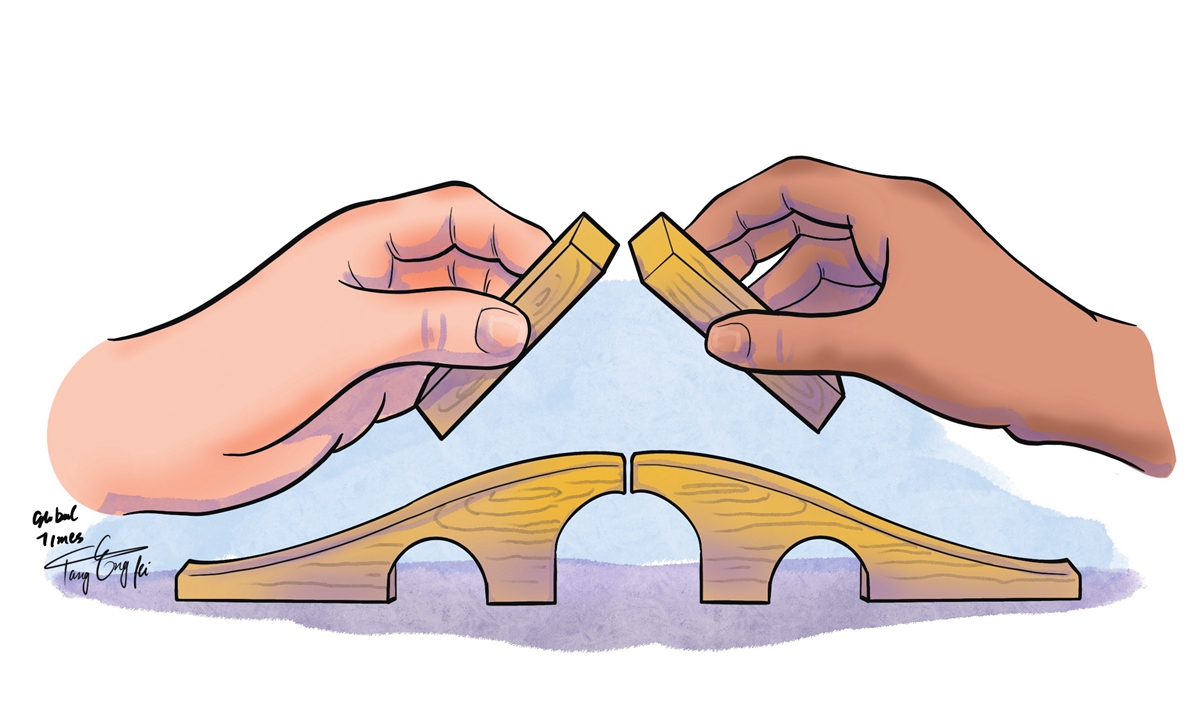
Illustration: Tang Tengfei/GT
China's commitments to infrastructure projects in sub-Saharan Africa impressively dwarf that of the West, according to new study findings, speaking convincingly to the actual achievements of the China-proposed Belt and Road Initiative (BRI) that builds bridges between different parts of the world.
By comparison, the West that has kept itself entertained with ill-grounded criticism toward the BRI is making little progress in its African infrastructure funding, despite a slew of infrastructure-centric initiatives that are being touted as BRI substitutes.
Absurdly, the addiction to finding faults with China, compounded by the continued iteration of lip service, has established the US-led Western taskforce as the culprit of dismantling bridges for the global community in dire need of increased interconnectedness.
From 2007 to 2020, China's development banks lent $23 billion for infrastructure projects in sub-Saharan Africa, more than double the funding provided by such development finance institutions in the US, Germany, Japan and France combined, Reuters reported on Wednesday, citing a new study by the Center for Global Development (CGD), a Washington DC-based think tank.
More strikingly, the US International Development Finance Corp, the main US development funding agency, provided merely $1.9 billion in financing for infrastructure in the region during the period, not even one-tenth of the amount of the Chinese funding, the study found.
The stunning comparison apparently speaks volumes for a truly constructive role China has played in the African continent, a pivotal component of the BRI.
In an address to a reception celebrating the 58th Africa Day in Beijing in May 2021, Chinese State Councilor and Foreign Minister Wang Yi said that in the front of the COVID-19, China has remained Africa's top trading partner for 12 years in a row.
The China-Africa cooperation under the BRI has continued to deepen, with 46 African nations and the African Union Commission having inked cooperation deals with China, according to Wang.
The China-Africa tie-up is seen as underpinning the BRI framework.
China had signed more than 200 documents on BRI cooperation with 147 countries and 32 international organizations, Jin Xiandong, a spokesperson for the National Development and Reform Commission, disclosed in mid-January.
China's financing of sub-Saharan African infrastructure conspicuously turns the BRI-enabled vision of inclusive growth across the globe into a reality, pumping up the much-needed funding and access to technology for the African continent to connect with the rest of the world.
The West, the US in particular, nonetheless, is shown to be holding onto its hackneyed anti-China rhetoric, with a variety of seemingly fancy plans such as the US-led G7 initiate known as the Build Back Better World (B3W) and the EU's Global Gateway, coming across as a slew of recycled ideas and rhetoric.
A friend in need is a friend indeed. It's evidently clear to the African people where the true friendship stands.
For those who have gone to extremes to misinterpret the BRI as debt trap diplomacy, all such compelling comparisons ought to be a wake-up call for them to get back on the right track for global inclusivity.
With a number of BRI signature projects in Africa and elsewhere globally - financed by Chinese development banks, other BRI economies and multilateral finance agencies - well in progress to address the global infrastructure divide, those deliberately sowing seeds of discord, it is believed, would automatically be silenced.
What sub-Saharan Africa, one of the poorest regions of the world, genuinely wants is a helping hand to enable it to join a global trend of interconnectedness, rather than lip services or carrot and stick options that put sub-Saharan African countries at risk of decoupling.
It doesn't matter however spectacular the B3W and the Global Gateway seem. What matters is whether such initiatives would genuinely funnel money into regions such as sub-Saharan Africa where infrastructure projects would be critical to local economic growth.
It's high time for the US-led Western world to join hands with China to build bridges between the rich and poor parts of the world, or at least China's efforts to build a better world need to be fully respected.
The author is a reporter with the Global Times. bizopinion@globaltimes.com.cn




